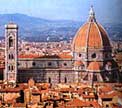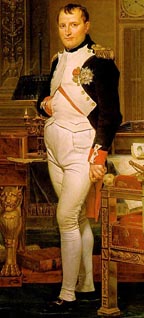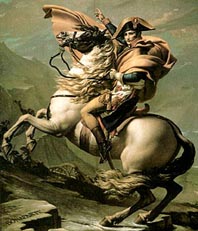
|


|
|
|
Mr. Sedivy's
More Features:
|
Highlands Ranch High School - Mr. Sedivy - World
History -
The Life of Napoleon Bonaparte Napoleon Bonaparte (1799 - 1813)
Napoleon was a former Jacobin. He was the son of poor nobles. Napoleon joined the Jacobins because, as he wrote in a letter to his brother, "Since one must choose sides, one might as well choose the side that is victorious, the side which devastates, loots, and burns. Considering the alternative, it is better to eat than be eaten." Napoleon Bonaparte became France's foremost military leader. He drove the British out of France in 1793. Napoleon beat the Austrians in 1796. The Austrian Hapsburgs wanted the monarchs back. Napoleon failed in Egypt, but he kept news of the worst losses from reaching France. He sent people to study Egypt's history, and these people found the Rosetta Stone. Napoleon wanted to establish a base so that France could attack England in both Africa and India. Napoleon gained the love of the French people by proclaiming, after a victory at Austerlitz, that he would adopt the children of all the soldiers. He then ordered the state to pay for the children's support and education, arrange marriages for the girls, and find jobs for the boys; he let them all add Napoleon to their names. In 1799, Napoleon was a general in the Middle East. He had just decided to release 1,200 prisoners. Napoleon coughed and said, "Ma sacree Toux." (my confounded cough) His officers thought he said, "Massacrez Tous." (kill them all) The officers executed all 1,200.
In November 1799, Napoleon overthrew the Directory,
a coup d’etat. France was to remain a Republic, but he made himself
First Consul for Life saying, "I am no ordinary man." The people
agreed and voted him emperor in 1804. Napoleon invited the Pope
to preside over his coronation. He took the crown from the Pope's
hands and placed it on his own head to show that he owed his throne
to nobody. Napoleon was a great Leader. He balanced the budget, and established the Bank of France. He controlled prices, started public works to put people to work, and encouraged new industry. Order, security, and efficiency replaced liberty, equality, and fraternity as the slogans of the new regime. The Napoleonic Code
As his armies marched across Europe, they did away with serfdom and spread liberty and equality. Napoleon reached his height by 1810; he had most of Europe. He divorced his wife to marry a Hapsburg (the niece of Marie Antoinette). Napoleon won many victories, and had several huge losses. He valued rapid movements and made effective use of large armies. He developed new plans for each battle, so the enemy could never figure out what was going to happen next. The French Revolution 2. Tennis Court Oath / Storming of the Bastille 3. The Reign of Terror and the Guillotine The Napoleonic Era 5. Napoleon's Problems / Related Information Historical Periods of | Prehistory
| Mesopotamia & Phoenicians |
|
Highlands Ranch High School ![]() 9375 South Cresthill Lane
9375 South Cresthill Lane ![]() Highlands Ranch, Colorado 80126
Highlands Ranch, Colorado 80126 ![]() 303-471-7000
303-471-7000
Mr. Sedivy's History Classes
| Colorado History | American
Government | Modern European History | Advanced
Placement European History | Rise of England
| World History |
| Home | Back to top of page |
Site Contents |




